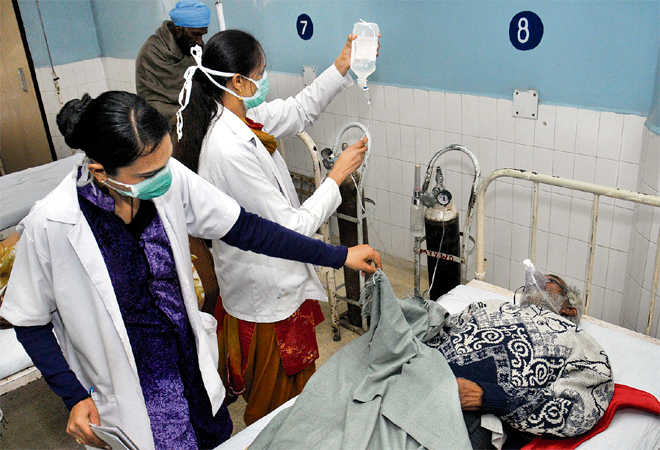
Hazardous: Nurses at the Civil Hospital, Jalandhar, attend a patient. Tribune file photo by Malkiat Singh
Radha Saini and Brahmkumari Rupa Upadhaye
The theme of International Nurses Day 2018 is ‘Nurses: A voice to lead — Health is a Human Right’. The Indian healthcare system is mainly "disease focused" and not "individual centered". The lack of a "people-centered approach" has crippled the universal health coverage and undermined the indispensible role of nurses in delivering optimum quality of care to the patients. The World Health Organization (WHO), Geneva, recommends nurse-patient ratio of 1:500 whereas in India, it is 1:1,100 and as per one estimate, there is a shortage of 2.4 million nurses. This is owing to meagre salaries of nurses in hospitals, non-conducive work environment, few chances of promotion and self-development and low recruitment, all of which results in migration and attrition.
Nurses are the first care providers to the patients; they are constantly exposed to body fluids and contaminations of patients, apart from other occupational hazards in the hospital settings. The worst hit are the oncology nurses who administer cytotoxic drugs or the anti-neoplastic drugs to cancer patients since even after using personal protective equipment (PPE), they remain exposed to nanoparticles emitted by these drugs. Nanoparticles enter the body through inhalation, ingestion, and dermal absorption and are responsible for the development of cardiovascular diseases, respiratory complications, dermatological reactions, spontaneous abortions, cancers, fertility problems and long-term genetic changes in foetus.
The nurses working in the emergency and trauma units have high prevalence of needle-stick injuries, musculoskeletal disorders, sleep deprivation disorders, depressive spells, stress and burnouts, apart from being exposed to bashing by violent patients and relatives.
Unfortunately, no policy, guideline, legislation or protection system exists for the nurses. There is no safety protocol either in book, law or practice.
In reputed central government institutes, the nurse-patient ratio is 1:50 in the general wards. It means that one staff nurse has to take care of 50 patients in one shift. They are also made to undertake non-nursing responsibilities, ranging from maintaining the drug inventory, CSSD (Central Sterile Supply Department) inventory, medical equipment stock, linen stock, attending telephone calls of patient’s attendants, guidance and counseling of patients and their relatives, and supervising student nurses, ward attendants, general duty attendants and sweepers.
The scenario is the same in the state government-run hospitals where nurses are not provided any PPE like gloves, gowns and masks. Also, no biological safety cabinets (BSC) are provided for the preparation and storage of chemotherapy drugs, hence exposing the nurses to hazards, including cancers.
Nurses attain autonomy by increasing their educational qualification. Recently, the nurse practitioner (NP) course started by the Indian Nursing Council in critical care nursing drew flak as there is no well-defined scope of practice, standards of care and core competencies of NPs in their respective area of practice. The mushrooming of nursing colleges has eroded the ethics and sanctity of the profession in terms of poor quality of care being delivered by the young graduates of today. That is because they have had very little/ poor clinical exposure (practical training) while pursuing their degrees/diplomas. All types of illegal practices thrive in these private colleges in order to make their students pass their examinations, making a strong case to take their practical exams under camera.
The scenario of masters and doctorate nurses is worse as they are away from patient care or clinical set-up, having been absorbed into teaching student nurses. Not even 0.1 per cent nurses at the post of associate professor and above either in private or government college of nursing in the entire North India have 10 research publications in peer reviewed national indexed journals of repute (contrary to the mandatory guidelines of Indian Nursing Council, New Delhi). Most of the studies undertaken by them are KAP (knowledge, attitude and practices-based) studies and a majority of them have not complied with the right sampling methods, research designs and sample size.
Teaching standards have deteriorated in even in premier nursing institutions. The teachers’ promotions and salary increments are based upon political linkages and not academic excellence and they have no aptitude to pursue research to upgrade their knowledge.
A robust governance structure in nursing education needed
This grim situation in the nursing sector in India calls for the establishment of a robust governance structure in nursing education by the following ways:
- To give equity of access to health services to the people, the government should consider formulating a course on "rural community health nursing" exclusively for rural areas which are resource-constrained, deplorable and disadvantaged.
- Exit exam for nursing graduates should be a must (like in the USA, Canada) in order to obtain licensure to practice as a staff nurse or a nursing teacher. Practical exams and viva of MSc nursing students should be held under camera.
- A post-graduate course in occupational health nursing be started by the Indian Nursing Council (INC). It must include a course on nanotechnology in the curriculum. Laws to be formulated and healthcare policy be made by Ministry of Health and Family welfare, Indian Council of Medical Research for protecting nurses from occupational health hazards.
- Continuous upgradation of the skills of nurses in the form of inservice education programmes and the promotion of nurses in both clinical and teaching side be made on this criteria.
- Inspection criteria of the state licensing council, INC and university to be strengthened while giving annual recognition to the nursing colleges.
Radha Saini, Senior Lecturer, College of Medicine and Allied Health Sciences, Freetown, Sierra Leone
Brahmkumari Rupa Upadhaye, National Florence Nightingale Awardee 2018 and Chief Nursing Officer, J Watumall Global Hospital and Research Centre, Mount Abu



























